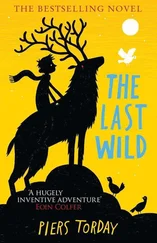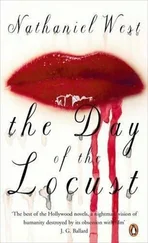There was nothing before us but granite boulders lifting up from the ground like bunkers, covered in flat, wide leaves. I followed Glynnis into the woods. With each step it felt I was somehow moving further back into time. This was evident at the very least from the clouds of black midges, which grew in density as the vegetation thickened until they seemed to envelop our heads. We had no such dense forest anywhere near Leitmeritz. Alongside the Elbe trees might offer protection, but I was used to the swish of tall grasses. I don’t believe I’d taken in so many smells in years, if I’d ever smelled so much before — deep rich loam kicked up beneath our feet, the tickle of spores from toadstools lifting up sharp like mustard. I’d been looking at my feet so long — the breaking of toadstools, the overturning of thick leaves, all of this so different from that rigid cobblestone order of my youth and memory — I didn’t realize Glynnis had stopped.
“We’re here,” she said. We went in through the mouth of the cave. It was far smaller than what I’d imagined. Having never seen people living in a cave before, I don’t know that I’d imagined much of anything. Glynnis stooped down and I stooped behind her. We squeezed through a dank passageway, alongside which walls jabbed at my hips, until I heard a sound ahead. At first I thought it was the babbling of a brook, but as we walked farther in, I saw light flitting in the distance. By then we were standing, and the babbling of the creek was the sound of voices, voices growing louder until I could see the back of Glynnis’s brown hair and ovoid shapes materialized alongside voices and then we were in a room with a cave ceiling twenty feet above our heads. Ahead of me were hundreds of people, all sitting on stools of stalactites and blankets dark and shadowy amid light produced by candles and an occasional kerosene lamp.
“It will take us some time before we’re able to find my mother,” Glynnis said. “I’ll ask around.”
She went forward to find a familiar face. I wandered. When they were children, Glynnis told me some time later, she and her brother had come to see their grandmother, and they came to spelunk in these caves. What we’d seen at the Leicester Square station only weeks before was nothing compared with this small village belowground. In a far recess of this enormous cavern, in the soft darkness of the cave’s shadow, men stood before large cauldrons, cooking for the masses. It was almost impossible to see where door openings led off into the farther recesses of the cave. For a moment panic gripped me as I couldn’t see where I was going and I felt I heard someone calling my name, and then a hand was on my arm.
“It’s confusing in here until you’ve learned your way,” Glynnis said. “Stick with me.”
“You’ve found your mother?”
“She doesn’t like to be kept waiting.”
We walked from the few light sources until I could feel cool moisture lifting off cave walls. We were squeezing again through a passageway just wide enough to let others past. Bodies pressed against me without a word of apology. Someone was breathing heavily behind me and soon he was pressed up against me. I thought to turn and say something when light came before us again and we were in a smaller cavern, this one with ethereal white planes covering the ground ahead.
“This is where Mother sleeps,” Glynnis said. She took me by the hand. We crouched alongside a mattress nested on the cave floor. Mrs. Goldring was lying prone. When Glynnis announced our presence, her mother did her best to prop up on one hand.
“Mother, this is—” Glynnis said. But she stopped there as I’d already begun speaking.
“My name is Poxl Weisberg, Mrs. Goldring,” I said. “It’s a pleasure to meet you.”
The English and the accent I’d acquired in the previous months were a source of pride for me.
“Wherever are you from?” Glynnis’s mother asked.
It was impossible to tell if she was looking at me, as a bright kerosene lamp cast light behind her, obscuring her face in deep shadow. I told her I lived near Bermondsey now, in Corbett’s Passage, where I worked as a squaddie.
“Not what I meant,” she said.
“Well, Mother, I told you that Poxl is Czech, come to help with the war effort,” Glynnis said. She had, she had, Mrs. Goldring said. She was sorry; she’d forgotten.
Glynnis’s mother was suffering from the very earliest stages of dementia. At first the frankness of her ramblings caused me great discomfort. While Glynnis worked to set up her linens and to see what needed to go back with us to London for cleaning, I did my best to engage her mother. At times she rambled about poisonous snakes she believed were populating the latrine cave, or old Mr. Lovelace whom she knew from childhood and whom she feared might take liberties with her in her sleep. But soon a kind of honesty arose amid her bellyaching.
“It’s about impossible to sleep in this cave,” Mrs. Goldring said. Before I could ask her why, she continued. “Isn’t a single flat spot anywhere in this whole room. I’ve put my bed down everywhere I could and one space is bad as the next.”
“What’s so bad?”
“Ever slept on uneven ground?”
It was a simple question, but one that took me some time to answer.
“No,” I said.
“For a time you might settle into it,” Mrs. Goldring said.
My eyes had adjusted to the dark now. Deep creases drew down from the prim line of Mrs. Goldring’s white mouth. She wasn’t looking at me — she looked up at the ceiling, off at the sleeping men behind her. She didn’t look me in the eyes.
“Without fail, every night, I jump upright, gripping the sides of my mattress. Even the slightest tilt, the slightest dip to one side or the other, and there’s no way but to feel you’re falling off the ends of the earth. As if the whole world has tipped, invested in shaking you from it.”
I didn’t know what to say. More than anything it was nice to hear someone complaining about something so mundane. For so long it had been the stiff upper lip of the Britons — and only that stiff upper lip. How good it could feel to hear someone complain. I asked Mrs. Goldring if she didn’t find some entertainment here. Had she made friends? She looked at me a bit oddly and then with no small fanfare pulled out from beside her pallet a large book. It was wrapped in oilskin, and so had no water damage from that damp floor.
“I read at a play each night, and that keeps me going,” Mrs. Goldring said. In her hands she held a complete edition of Shakespeare, a portable edition in soft cover she’d brought with her. We’d been assigned a German translation of Romeo and Juliet in the gymnasium back in Leitmeritz, but if I’d paid any attention, not a word or character or idea had stuck.
Now something stirred in Mrs. Goldring — and in me. I don’t know if it was the plays, or the company, or the simple fact of our having a respite from the Blitz, but I focused completely on listening to Glynnis’s mother. Where in the moments before — and in so many of the days to come — Mrs. Goldring’s oncoming dementia had brought her from complaint to compliance, from cohesion to chaos, when she began to speak of the madness of Lear, suddenly precise thoughts coalesced. She told me much about these characters I’d never heard of. Her favorite, Mrs. Goldring explained, was Cordelia. The love for a father should always be so strong and clear, she said, and she could only hope that her Glynnis loved her quite so much. When I told her I didn’t know this play, for the first time Mrs. Goldring stood.
“Don’t know the greatest achievement of Western culture, Mr. Weisberg!” she said. “Only one way to remedy such a grave offense.”
Читать дальше












